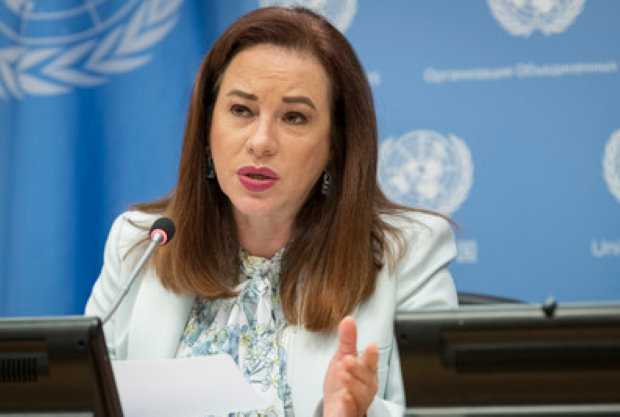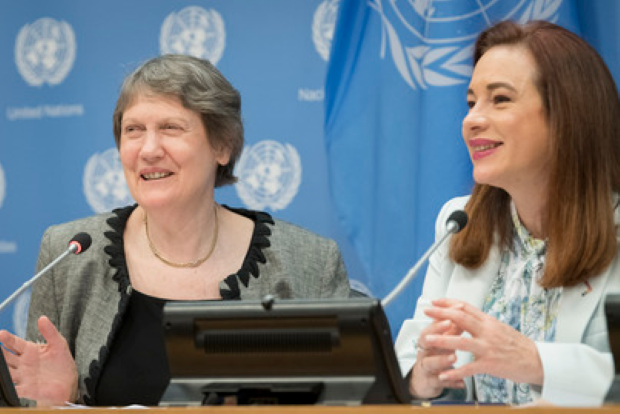This past Monday, the President of the General Assembly of the United Nations, María Fernanda Espinosa Garcés, organized an informal plenary meeting on “Gender Equality and Women’s Leadership for a Sustainable World” at the UN headquarters in NYC. The event takes place alongside the annual, global High-level Political Forum (HLPF) on Sustainable Development that is currently in progress at UN headquarters. The Forum’s theme, “Empowering people and ensuring inclusiveness and equality,” runs as a complement to that of the meeting organized by the President.
President Espinosa’s initiative provided a stage to follow up on her previous high-level event on “Women in Power” that took place on March 12, 2019. It allowed for the distinguished leaders of varying backgrounds to address unique ideas on one common issue – how to “identify barriers that hinder women’s full participation and leadership, and share best practices that can accelerate women’s empowerment.”
Deputy Secretary-General Amina J. Mohammed was one of the illustrious leaders that spoke at the gender equality meeting. During her opening remarks, the Deputy Secretary-General emphasized that women have a “long track record as agents of change.” As such, she emphasized that women’s full participation in leadership was key to “unlocking the transformational change we seek,” especially in achieving the sustainable goals in the designated timeframe. Additionally, women’s involvement as decision makers meant more “inclusive solutions that will benefit everyone,” from social protection to health and education. According to the Deputy Secretary-General, gender parity for all meant “unlocking trillions for economies.” She pointed out that gender parity in senior leadership at the UN was already well ahead of the targeted 2021 goal, as Secretary-General Guterres had promised at the outset of his term. The Deputy Secretary-General stressed that “women’s equal participation is a basic democratic right,” and was especially important to remember amidst the current “pushback” on the rights of women and girls by forces such as extremist groups.
According to a UN report, the General Assembly President issued a “Call for Action” during her event. She requested global leaders to join her “Call,” and has received the support of 18 thus far. As the fourth woman ever to be elected President of the General Assembly, Garcés acknowledged that there was still much work to be done in the area of gender equality since “no country has achieved full gender equality.” According to the President, only “42 per cent of countries give women the same rights to land ownership; and just 60 per cent give women equal access to financial services. Furthermore, the gap is even greater among women in rural areas, women with disabilities, indigenous women and older women.” President Espinosa voiced that, “Many of you will have heard me refer to gender equality as the closest thing we have to a ‘magic formula’ for sustainable development.” However, bear in mind that although the impact may be magical, there is “nothing magical about how to achieve gender equality.”

María Fernanda Espinosa Garcés, President of the seventy-third session of the General Assembly, briefs press on gender equality and women’s leadership for a sustainable world. (Photo by:
UN Photo/Mark Garten)
Following the meeting on gender equality, there was also a press conference with a panel consisting of the President of the General Assembly, the Executive Director of UN Women, Phumzile Mlambo-Ngcuka, and former Prime Minister of New Zealand, Helen Clark. President Espinosa began the conference by stressing the need for women to be represented in the same proportion that they constitute demographically, women make up 50 per cent of the population. She cited the need for more efforts as the last meeting in March demonstrated that there were only 19 heads of state in government that were women out of the 193 member countries that make up the UN.
UN Women Mlambo-Ngcuka addressed the under-representation of women in decision-making bodies. She stated that it was “one of the five critical areas that are a barrier to gender equality.” However, the director mentioned that there was a variety of interventions that could “fast track the representation of women using special measures and quotas.” She gave the case of Tunisia, where women representation in government has moved up to 47% because of special measures taken. The UN Women director stressed that although there was still a way to go in achieving gender equality, it was not “mission impossible.”

Phumzile Mlambo-Ngcuka, Executive Director of UN Women, briefs press on gender equality and women’s leadership for a sustainable world. (Photo by: UN Photo/Mark Garten)
Former prime minister Helen Clark, having been a candidate for Secretary-General, was asked by a journalist on her views of the current Secretary-General’s efforts in appointing women to leadership positions at the United Nations. Clark responded that Guterres has appointed many, but that there were still specialized agencies that have spaces for women and still not enough women in positions at the top.

Helen Clark, former Prime Minister of New Zealand and former United Nations Development Programme (UNDP) Administrator, briefs press on gender equality and women’s leadership for a sustainable world. (Photo by: UN Photo/Mark Garten)
During the press conference the former prime minister also addressed the controversy surrounding abortion that is currently prominent in the US. She expressed that, “a full range of sexual and reproductive health and rights should be available, and abortion is on that menu. Of course, with good family planning and access to services, most will never get to access that end of the spectrum, but it has to be there, it has to be safe; and to try to …shut down discussion, and shut down funding…is very concerning for women.” She ended by saying, “put it back in the hands of women, give them real choices.”
The urgency for gender equality and women’s empowerment addressed in this event, organized by the General Assembly President, couldn’t come at a more opportune time. Just this past June, a Kenyan lawmaker was charged with assaulting a female colleague so hard that she was bleeding from the mouth. As the leaders of this event mentioned, and as this incident in Kenya demonstrates, there is still much work to be done within gender equality, such as violence against women and gender parity in leadership positions. As they stressed, women are essential to achieving the sustainable development goals for 2030, or else there is “no hope.”












